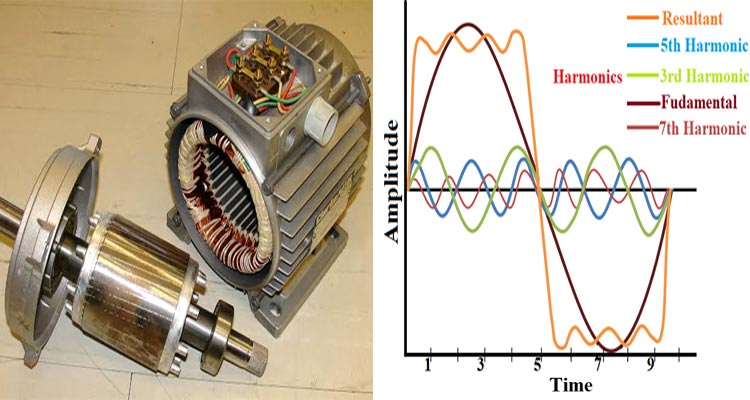
Harmonic distortion has always been a problem for electrical engineers as it leads to heavy power loss in AC induction motors and transformers. These losses in AC induction motors leads to excessive heating, which happens because of additional copper losses and iron losses (eddy current and hysteresis losses) in the stator winding, rotor circuit, and rotor laminations. This causes lots of electrical equipment failure in the plants.
At a frequency of 300 Hz and above, these losses increase further high due to skin effect, and the leakage magnetic fields caused by harmonic currents produce additional stray frequency eddy current dependent losses. This considerable amount of iron losses can also be produced in induction motors with skewed rotors due to high-frequency-induced currents and rapid flux changes i.e. due to hysteresis in the stator and rotor.
Excessive heating can worsen the bearing lubrication and complete bearing collapse. Besides, harmonic currents can result in bearing currents, which can be prevented by the use of an insulated bearing which is a very common practice used in AC variable frequency drive-fed AC motors. Overheating imposes significant limits on the effective life of an induction motor. For every 10°C rise in temperature above the rated temperature, the life of motor insulation may be reduced by as much as 50%. Squirrel cage rotors can generally withstand higher temperature levels as compared to wound rotors.
The motor windings (especially if insulation is class B or below) are also susceptible to damage due to high levels of dV/dT i.e. rate at which the voltage rises such as those attributed to line notching and associated ringing due to the flow of harmonic currents.
Harmonic sequence components adversely affect induction motors. Positive sequence components (i.e., 7th, 13th, 19th ...) assist torque production, whereas the negative sequence components (5th, 11th, 17th ...) act against the direction of rotation resulting in torque pulsations.
Zero sequence components (i.e., triplen harmonics) are stationary and do not rotate, therefore, any harmonic energy associated with them is dissipated as heat. The magnitude of torque pulsations generated due to these harmonic sequence components can be significant and cause shaft torsional vibration problems.
About the Author
 Avinash Singh is an Electrical Engineer with over 11 years of rich experience in Electrical Maintenance, Installation, Testing, and Commissioning of all major electrical equipment. He is specialized in bringing down Energy Cost of a Plant by reducing electricity bills and increasing energy efficiency. He also reduces plant breakdown costs by implementing proper maintenance activities during routine and shutdown. Through these Case Studies, he shares his experience and challenges faced in his work routine with the readers of Circuit Digest.
Avinash Singh is an Electrical Engineer with over 11 years of rich experience in Electrical Maintenance, Installation, Testing, and Commissioning of all major electrical equipment. He is specialized in bringing down Energy Cost of a Plant by reducing electricity bills and increasing energy efficiency. He also reduces plant breakdown costs by implementing proper maintenance activities during routine and shutdown. Through these Case Studies, he shares his experience and challenges faced in his work routine with the readers of Circuit Digest.





